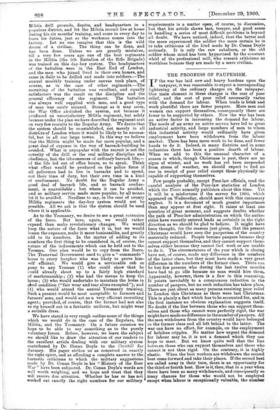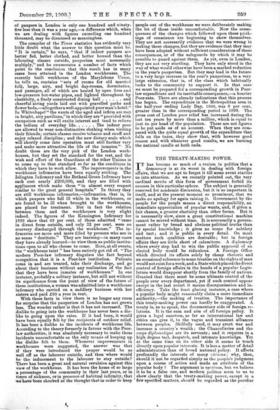THE PROGRESS OF PAUPERISM.
IF the war has laid new and heavy burdens upon the taxpayer, it was reasonable to expect a corresponding lightening of the ordinary charges on the ratepayer. One main element in these charges is the cost of poor relief, and the cost of poor relief necessarily varies with the demand for labour. When trade is brisk and work plentiful there are fewer paupers. More men and women can support themselves, consequently there are fewer to be supported by others. Now the war has been an active factor in increasing the demand for labour. The needs of an army on active service have led to great industrial activity, and large numbers of men to whom this industrial activity would ordinarily have given employment have been withdrawn from the labour market. There has been more work to be done, and fewer hands to do it. Indeed, in many districts and in some industries there has been a positive dearth of labour. When we add to this the unusual character of a season in which, though Christmas is past, there are no signs of winter, and no work has yet been suspended from stress of weather, we should expect to find no one in receipt of poor relief except those physically in- capable of supporting themselves.
Few people probably, except Poor-law officials, read the careful analysis of the Poor-law statistics of London which the Times annually publishes about this time. Yet it will be a misfortune if the survey for 1900, which appeared on Wednesday, should meet with this customary neglect. It is a document of much greater importance than may appear at first sight. It raises at least one question of great moment, and suggests doubts whether the path of Poor-law administration on which the autho- rities have recently entered leads as certainly in the right direction as we should be glad to believe. It might have been thought, for the reasons just given, that the present Christmas would have seen the pauperism of the country materially reduced. People become paupers because they cannot support themselves, and they cannot support them- selves either because they cannot find work or are unable to do it. The circumstances of the year which is closing have not, of course, made any difference in the numbers of the latter class, but they must have made a very great difference in the numbers of the former class. There can be but few persons who during the last twelve months have had to go idle because no man would hire them. Apparently, however, there is a flaw in this reasoning. It points inevitably to a conspicuous reduction in the number of paupers, but no such reduction has taken place. There are just about as many persons receiving poor relief in London this Christmas as there were last Christmas. This is plainly a fact which has to be accounted for, and in the first instance no obvious explanation suggests itself. No doubt if the line between those who can support them- selves and those whp cannot were perfectly rigid, the war might have made no difference in the number of paupers. All the men withdrawn from the country would have belonged to the former class and all left behind to the latter. The war can have no effect, for example, on the employment of helpless cripples. No matter how urgent the demand for labour may be, it is not a demand which they can hope to meet. But we know quite well that the line betwcen those who can support themselves and those who cannot is not thus rigid. On the contrary, it is highly elastic. When the best workers are withdrawn the second best come forward and take their places. If the second best are called away in their turn, there is an opportunity for the third or fourth best. How is it, then, that in a year when there have been so many withdrawals, and consequently so many chances for those who would not be employed except when labour is exceptionally valuable, the number of paupers in London is only. one hundred and ninety- five less than it was a year ago,—a difference which, when we are dealing with figures exceeding one hundred thousand, may be dismissed as meaningless.
The compiler of the Times statistics has evidently very little doubt what the answer to this question must be. "It is certain," he says, "that if indoor paupers are better fed, better clothed, and better housed than the labouring classes outside, pauperism must necessarily multiply," and he enumerates a number of facts which point to the conclusion that this result has in many cases been attained in the London workhouses. The recently built workhouse of the Marylebone Union, be tells us, contains "sets of rooms for old married folk, large, airy, and bright day-rooms, dormitories, and passages, all of which are heated by open fires and low-pressure hot-water pipes, and lighted throughout by electricity, a finely constructed dining hall and cheerful airing yards laid out with gravelled paths and flower beds,—altogether a well-appointed poor man's hotel." In Whitechapel " the wants of the aged and infirm are met in bright, airy pavilions," in which they are "provided with occupation such as will excite interest and tend to relieve the tedium of everyday life The indoor poor are allowed to wear non-distinctive clothing when visiting their friends; certain classes receive tobacco and snuff and enjoy relaxed discipline ; and the new dietary scale which will shortly come into operation must still further vary and make more attractive the life of the inmates.' NO doubt these are the very pick of the London work- houses, but they set the standard for the rest, and the wish and effort of the Guardians of the other Unions is to come up to that standard so far as the conditions in which they have to work allow. The improvements in the workhouse infirmaries have been equally striking. The Islington Infirmary and the Bethnal Green Infirmary have each cost nearly £200,000, and they are filled with appliances which make them "in almost every respect similar to the great general hospitals." In theory they are still workhouse infirmaries,—infirmaries, that is, in which paupers who fall ill while in the workhouses, or are found to be ill when brought to the workhouses, are placed for treatment. But in fact the relation between them and the workhouses is very slight indeed. The figures of the Kensington Infirmary for 1899 show that 69 per cent. of those admitted "came in direct from outside, and only 22 per cent, were on recovery discharged through the workhouse." The in- firmaries are more and more filled by persons who are in no sense "destitute." They are learning—in many cases they have already learned—to view them as public institu- tions open to all who choose to come. Here, at all events, the "workhouse taint" has been entirely got rid of. "The modern Poor-law infirmary disguises the fact beyond recognition that it is a Poor-law institution. Patients come in and are treated, take their discharge, and go about their business without any realisation of the fact that they have been inmates of workhouses." In one instance, probably a solitary instance, but still not without its significance from the point of view of the future of these institutions, a woman was admitted into a workhouse infirmary who carried on a saddlery business with her sisters and paid £80 a year in rent. With these facts in view there is no longer any room for surprise that the pauperism of London has not grown less. The wonder rather is that it has not increased. The dislike to going into the workhouse has never been a dis- like to going upon the rates. If it had been, it would have been equally felt by the recipients of outdoor relief. It has been a dislike to the incidents of workhouse life. According to the theory formerly in favour with the Poor- law authorities, it was absolutely necessary to make these Incidents uncomfortable as the only means of keeping up the dislike felt to them. Whenever improvements in workhouses were suggested, the answer was that if they were introduced the pauper would be as well off as the labourer outside, and then where would be the inducement to the labourer to stay outside ? There has been a great and natural revulsion against this view of the workhouse. It has been the home of so large a percentage of the community in their last years, or in times of sickness, or in presence of habitual infirmity, that we have been shocked at' the thought that in order to keep people out of the workhouse we were deliberately making the lot of those inside uncomfortable. Now the conse- quences of the changes which followed upon these prick- ings of conscience are begiuning to show themselves. They are not necessarily evidence that we were wrong in making these changes,but they are evidence that they may have been adopted without sufficient consideration of these consequences, or of the safeguards by which it may be possible to guard against them. As yet, even in London, they are not very startling. They have only stood in the way of what would otherwise have been a marked reduction in the year's pauperism. But they may lead in the future to a very large increase in the year's pauperism, to a very large extension, that is, of the class which habitually looks to the community to support it. In that case. we must be prepared for a corresponding growth in Poor- law expenditure and its inevitable consequence,—a heavier Poor-rate. There are already indications that this process has begun. The expenditure in the Metropolitan area in the half-year ending Lady Day. 1900, was 8 per cent. greater than in the corresponding period in 1899. The gross cost of London poor relief has increased during the last ten years by more than a million, which is equal to just 4s. per head of the population. These are not figures to be put aside as of no account. When they are com- pared with the quite equal growth of the expenditure that falls on the taxes, they show that, with however good reason and with whatever good results, we are burning the national candle at both ends.



































 Previous page
Previous page